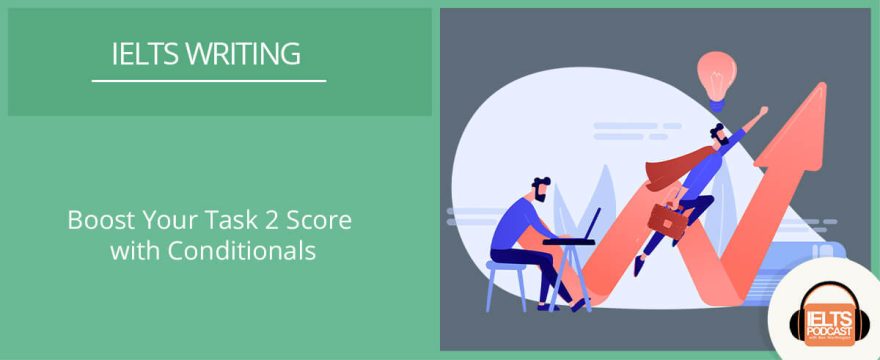In this tutorial, you will learn how to boost your IELTS Writing task 2 score with conditionals.
We look at:
- Tips to help boost your IELTS grammatical range and accuracy score.
- Importance of personalised feedback.
- Three reasons why you should use conditionals.
Stop! You’ve been struggling with your IELTS Writing Task 2, haven’t you? Going round in circles, unsure how to boost your score? Look no further, my friend, because I have a solution that’ll catapult you straight to the top! Conditionals and hypothetical examples, they’re your secret weapons.
My Eureka Moment
Now, you’re probably thinking, “How on earth did he stumble upon this?” So let me transport you back to a chilly afternoon in 2022. I was sitting in my favourite coffee shop, marking essays when I noticed something intriguing. Every high-scoring essay had one thing in common: they all utilised conditionals and hypothetical arguments. I could almost hear the light bulb clicking on in my head.
Five Solid Reasons to Love Conditionals
“But why,” you might ask, “should I even bother with conditionals?” Well, I have not one, but five reasons for you:
- Boost Your Grammar Score: Using conditionals demonstrates a wide range of complex grammatical structures. Examiners love this.
- Enhance Coherence and Cohesion: Conditionals help you logically link your ideas, creating a beautifully seamless essay.
- Flex Your Vocabulary Muscles: With conditionals, you can showcase a wider variety of language, including modal verbs and time phrases.
- Express Yourself Better: Conditionals allow you to accurately convey hypothetical situations or actions that rely on certain conditions.
- It’s What The High-Scorers Do: You want to join the high scorers club, right? Well, they’re all using conditionals.
Incorporating Conditionals in Your IELTS Task 2 Essay
Ready to start using conditionals like a pro? Good. Here’s how you can incorporate them in your essays:
- Zero Conditional: Use this when the result will always happen. Example sentences:– If you disregard the word limit, you lose marks.– When students prepare properly, they often achieve high scores.– Universities provide scholarships if the student is exceptionally gifted.
- First Conditional: Use this to talk about real and possible situations. Example sentences:– If governments invest more in education, societal progress will be inevitable.– Universities will produce better research if they receive adequate funding.– If we increase renewable energy usage, the impact of climate change will decrease.
- Second Conditional: Use this to talk about unreal or improbable situations. Example sentences:– If I were the minister of education, I would prioritise equal access to education.– Nations would have stronger economies if everyone had access to higher education.– If we could eliminate poverty, all children would have a chance at quality education.
- Third Conditional: Use this to talk about past situations that didn’t happen. Example sentences:– If the government had allocated more funds to public schools, the literacy rate would have been higher.– The graduation rate would have improved if schools had focused on vocational training.– If I had known about the importance of conditionals earlier, I would have aced my IELTS test.
The Magic of Hypothetical Arguments
On to our second star of the show: hypothetical arguments. These are powerful tools that allow you to develop a strong and coherent argument. Essentially, you’re playing a “what if” game. For example:
Some people think that universities and colleges should concentrate on the history of their own country rather than the history of other parts of the world. To what extent do you agree or disagree with this opinion?
Sample Body Paragraph
I firmly disagree with this viewpoint. If universities were to solely focus on the history of their own nation, students would likely develop a myopic worldview. International history provides a platform for comparison and critique, enriching students’ understanding of their own history. For example, if Japanese students were to only study Japanese history, they might be unaware of the global impact of World War II. They might overlook the international responses to the war and the subsequent formation of the United Nations. Consequently, their understanding of their own history would be incomplete.
The Sentence Guide Course: Your Fast-track to Success
Now, are you feeling a bit overwhelmed? Don’t worry, I’ve got just the thing for you: The Sentence Guide Course. With this in your arsenal, you’ll get a structured plan to incorporate conditionals and hypotheticals into your essays in no time.
Think of it as the ultimate cheat sheet, a map leading you straight to the high-scoring territory. It’s quick, it’s efficient, and it’s ready to transform your writing. Imagine submitting your Task 2 essay with unshakeable confidence, knowing you’ve nailed it.
This isn’t magic, it’s not even rocket science. It’s just the result of the Sentence Guide Course. You’re one decision away from writing essays that dazzle your examiners. So, what are you waiting for? Let’s conquer Task 2 together.
Join many other students who have achieved IELTS success with our online IELTS course or get instant feedback with our online essay checker.
You can download or listen to the full tutorial here:
| Direct Download Here | Stitcher | Apple Podcasts | Spotify
Podcast: Play in new window | Download
Subscribe: RSS

